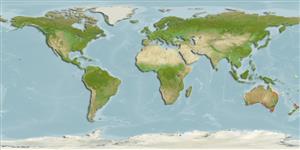Environment: milieu / climate zone / depth range / distribution range
بوم شناسي
دريايي نزديك كف زي; تغييرات عمق 0 - 10 m (Ref. 5316). Temperate
Western Pacific: Southport, southern Queensland to Port Phillip Bay, Victoria, and off Rottnest Island, Western Australia.
Size / Weight / سن
Maturity: Lm ? range ? - ? cm
Max length : 15.9 cm SL جنس نر / بدون خواص جنسي; (Ref. 5316)
Found over sand, rubble or vegetation; two specimens taken from floating Sargassum. Ovoviviparous (Ref. 205). The male carries the eggs in a brood pouch which is found under the tail (Ref. 205).
Life cycle and mating behavior
بلوغ | تولید مثل | تخم ریزی | تخم ها | Fecundity | توزاد ( لارو)
Male carries the eggs in a brood pouch (Ref. 205).
Dawson, C.E., 1985. Indo-Pacific pipefishes (Red Sea to the Americas). The Gulf Coast Research Laboratory Ocean Springs, Mississippi, USA. (Ref. 5316)
وضعيت در فهرست قرمز IUCN (Ref. 130435: Version 2024-2)
خطر برای انسان ها
Harmless
استفاده انسانی
ابزارها
گزارش های ويژه
بارگيری XML
منابع اينترنتي
Estimates based on models
Preferred temperature (Ref.
123201): 14.8 - 24.6, mean 18 °C (based on 395 cells).
Phylogenetic diversity index (Ref.
82804): PD
50 = 0.5625 [Uniqueness, from 0.5 = low to 2.0 = high].
Bayesian length-weight: a=0.00037 (0.00016 - 0.00085), b=3.18 (2.99 - 3.37), in cm total length, based on LWR estimates for this (Sub)family-body shape (Ref.
93245).
Trophic level (Ref.
69278): 3.4 ±0.5 se; based on size and trophs of closest relatives
جهندگی (Ref.
120179): زياد, كمينه زمان لازم براي دو برابر شدن جمعيت ، كمتر از 15 ماه (Preliminary K or Fecundity.).
Fishing Vulnerability (Ref.
59153): Low vulnerability (10 of 100).
